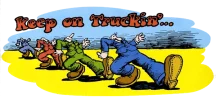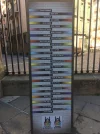Avelino Oliveira
New Member
Can you post how do you say "Bon Camino" in your language, please?
Portuguese - Bom Caminho
Portuguese - Bom Caminho
| Remove ads on the forum by becoming a donating member. More here. |
|---|
Walking in NZ I’ve noticed.....
On a city street it is all too common for my smile or friendly “hi” to be ignored. Runners especially do not deign to acknowledge walkers (except when I’m walking with a pack and poles - I’m guessing that puts one into the category of “athlete”!)
In the bush/On hiking trails it’s a different matter. But we are more likely to comment on the weather than wish each other a Buen Camino.
“Nice day for it” OR “Hope you beat the rain” OR if you haven’t beaten the rain “Good on you mate” or “You must be serious”
Thank you for the info, I had been wondering about this.In Spain it is almost the same that you describe for NZ and we only say "Buen Camino" on Caminos de Santiago.
You know the big difference? You actually say *something*. On the street, in the bars, in tiendas....and the one that really surprised me, in all the different waiting rooms we visited at the medical centre and hospitals we were sent to when my daughter broke her arm at O’Cebreiro (Triacastela, Sarria and Lugo). Everyone greeted us. When we got back to NZ and she had to have her cast removed I decided to try some Spanish friendliness in the hospital waiting room. I didn’t say hola, just a cheery HI! Recipients of my greeting fell into three categories:In Spain it is almost the same that you describe for NZ and we only say "Buen Camino" on Caminos de Santiago. Anywhere else out of cities we simply say "Hola" or Buenos días/Buenas tardes, Bo dia/Boa tarde in Galicia, Bon dia/Bona Tarda in Cataluña. In Basque Country and Navarra they say "Aupa".
Can you post how do you say "Bon Camino" in your language, please?

Chow down!Totally off topic, but I remember walking the LePuy route and having dinner with a multinational group. Everyone was supposed to say "bon apetitit" in his/her own language to start the dinner off. When I said there is no real phrase in English, and that an American would usually use "bon apetitt", one of the French pilgrims at the table told me that was not surprising. Since don't eat well in the US, he said, why would we have a phrase celebrating eating well.
... one of the French pilgrims at the table told me that was not surprising. Since don't eat well in the US, he said, why would we have a phrase celebrating eating well.
You know the big difference? You actually say *something*. On the street, in the bars, in tiendas....and the one that really surprised me, in all the different waiting rooms we visited at the medical centre and hospitals we were sent to when my daughter broke her arm at O’Cebreiro (Triacastela, Sarria and Lugo). Everyone greeted us. When we got back to NZ and she had to have her cast removed I decided to try some Spanish friendliness in the hospital waiting room. I didn’t say hola, just a cheery HI! Recipients of my greeting fell into three categories:
1) stare at the ground or their phone
2) stare at me as if I had three heads
3) one dear old lady asked, “Do I know you? I’m getting a bit forgetful”
Now I just smile at people!
You know the big difference? You actually say *something*. On the street, in the bars, in tiendas....and the one that really surprised me, in all the different waiting rooms we visited at the medical centre and hospitals we were sent to when my daughter broke her arm at O’Cebreiro (Triacastela, Sarria and Lugo). Everyone greeted us. When we got back to NZ and she had to have her cast removed I decided to try some Spanish friendliness in the hospital waiting room. I didn’t say hola, just a cheery HI! Recipients of my greeting fell into three categories:
1) stare at the ground or their phone
2) stare at me as if I had three heads
3) one dear old lady asked, “Do I know you? I’m getting a bit forgetful”
Now I just smile at people!
Norwegian: God tur!
Chaucer's pilgrims said: "Good gallop". Remember that they did not walk, they all rode on their horses.Did medieval English pilgrims in Chaucer’s day use any specific greetings or parting wishes?
Chaucer's pilgrims said: "Good gallop". Remember that they did not walk, they all rode on their horses
And ultreia may also well be a war cry of the crusaders which gives quite a different spiritual note to the expression...
Since the average American walks less than 3 miles a day in total steps, and hops in the car to go anywhere further than 1/4 mile away, it is not surprising that we don't have a colloquial phrase for this (well, ok, it's also because the Camino is not in the US).
Totally off topic, but I remember walking the LePuy route and having dinner with a multinational group. Everyone was supposed to say "bon apetitit" in his/her own language to start the dinner off. When I said there is no real phrase in English, and that an American would usually use "bon apetitt", one of the French pilgrims at the table told me that was not surprising. Since don't eat well in the US, he said, why would we have a phrase celebrating eating well.
Google tells me that in Gallego it is “bo xeito”!
Are there any Galicians in the house who can confirm?
If so, then after O Cebreiro we should all switch over...
Grazas! As usual, Google Translate disappoints.Yes I am Galician. For the expression "bo xeito" a native would understand "do the things very good" wich is confusing.
The right expression is "bo camiño"
That could be translated as "Praise the God" I think but it is used much more profanely for everyday use.... "Grüß Gott" (Southerners only). And if it's meant as a word of encouragement/good wishes said by the person who stays behind to the person who leaves, there's no standard expression.
Although I don't really speak French I always understood this expression as "Be brave (on your way)" or "Stay firm (in what you decided)"Although I heard it dozens of times, I am sometimes still amused when someone says "Bon courage" to me in French. The literal translation is "good courage" but I don't know of an equivalent in other languages.
In Irish it is "Go n-éirí an bóthar leat"
Although I heard it dozens of times, I am sometimes still amused when someone says "Bon courage" to me in French. The literal translation is "good courage" but I don't know of an equivalent in other languages. What you would say in English/German/Spanish/etc would really depend on the particular situation. And it's a bit similar with "Bon appetit/Guten Appetit/Buen provecho". Depending on the situation and the speaker, it would be "Enjoy your meal, sir" or "Let's stop talking and start digging in" in English.
Although I don't really speak French I always understood this expression as "Be brave (on your way)" or "Stay firm (in what you decided)"
Don't be so harsh with themShame on them...I can see the German translation is also very "anything" but I'll let that to others to respond. And I hope they won't because this doesn't deserve the respond at all.
Yeah, you are right, that sounds weird to us.The Italian Buona strada doesn't sound right to me.
When you do business you can't do it with Google translate, sorry.
Finnish: Hyvää matkaa! Dutch: Goeie reis!Can you post how do you say "Bon Camino" in your language, please?
Portuguese - Bom Caminho
Google Translate is not very good at translating, but you can listen to the pronunciationanother lovely thread (revived)!
can anyone explain how to pronounce this, please?
I would venture that in slovenian the equivalent used widely would be 'srečno' without anything added to the word. that way it encompasses the broadest possible meaning and could be used in all kinds of circumstances. 'srečno' simply means 'luck'.
but the closest expression which is not used that often, would be 'le pogumno'. it loosly means 'carry on bravely'.
I guess Juiste Spoor is supposed to be Dutch... don't think so! That simply means "The right track", which is not used as a greeting. I'd say, "Goeie reis" or use "Buen camino" with pilgrims
一路顺风 祝野地放尿顺利Can you post how do you say "Bon Camino" in your language, please?
Portuguese - Bom Caminho
Of course! Excellent.Ooh, I just thought of a candidate translation for my variety of English in the southwestern United States:
“Happy trails!”
@Jun Meng, thank you! It looks lovely. Can you describe what the words express? I'm sure it is not what Google Translate makes of it路顺风 祝野地放尿顺利
It means Safe journey and Hope You can find a good place to pee privately (i add the second phrase.)@Jun Meng, thank you! It looks lovely. Can describe what the words express? I'm sure it is not what Google Translate makes of it. And is your language in the list quoted earlier here: https://www.caminodesantiago.me/com...bon-camino-in-your-language.22153/post-594827 ?
I can't identify all the languages in the list but I think Arabic is missing? And would it be Yallah? It's funny how you pick up words and expressions in languages you don't know. Long before I started to learn Spanish, I knew already what "Vamos!" means. I like to think that this is how the Flemish pilgrims picked up "Ultreia!" on their way through France.
Chinese is a wide language to speak and i Didn't use slang SoGoogle can recognize well..
I change my mind about Google Translate ... it's astonishingly good.
I am glad you posted the list, it led to some enjoyable and interesting exchanges.I agree that the list I found outside the Pamplona Cathedral is a bit sub-par in terms of good translations/expressions that people might actually say, but I think the idea is fun.
@Kathar1na Yes, you're right that Arabic is missing--a big omission in my opinion. I love that you've heard "Yallah!" in walking/hiking contexts--it translates roughly to "Come on!" or "Let's go!" and is a fabulous expression to have in your back pocket for use with Arabic speakers.
PS: I'm still curious about the languages that are not written in Latin or Cyrillic script. Can anyone decipher them? Is Greek there (I'm not sure).

On the contrary. Plata is Spanish for silver and the route is named this way because Romans transported silver (and gold and other goods) from the hills in the Northern Spain to the Mediterranean shore.The Via de la Plata is usually called the same......not anything to do with "Silver"
Or even "Primativo"The Primatvo is normally called the "Primativo" by English speakers....not "Primitive". It is accepted by most veteran pilgrims that the name refers to the translation as "original" not "primitive."
That’s my experience too. By any chance, is it different among Brits? Do they ever talk about “the French Way,” “the English Way,” etc. or am I just being influenced by the retro tone of the Contrafraternity of St. James?Most native English speakers on the Caminos normally use the Spanish names for the routes without translation.


